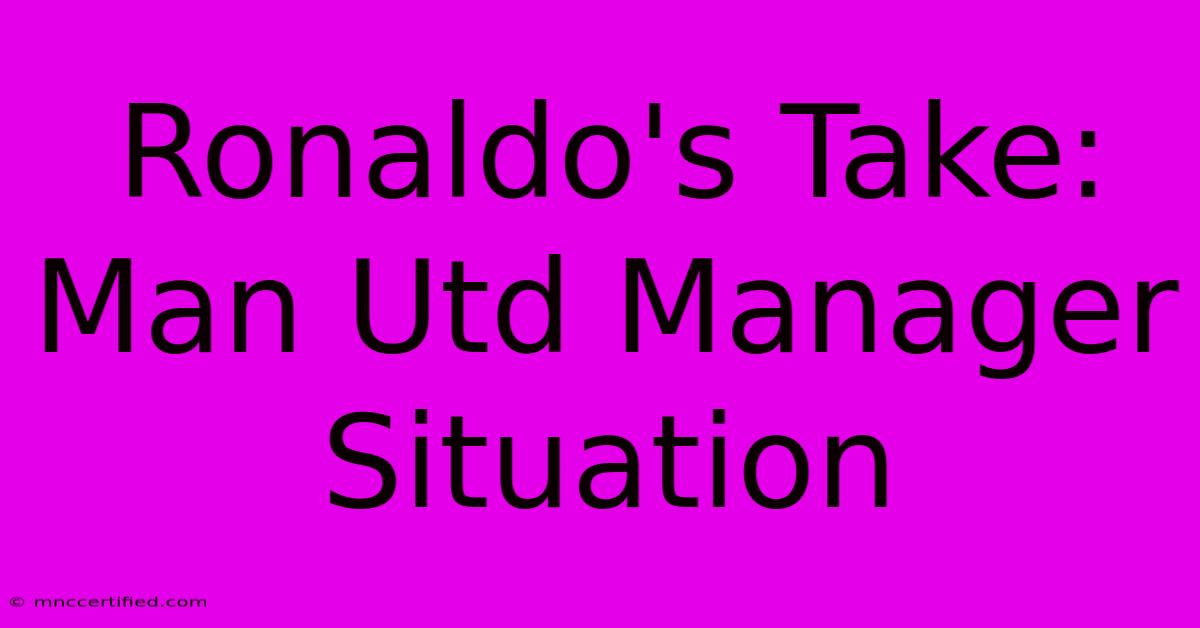Ronaldo's Take: Man Utd Manager Situation

Table of Contents
Ronaldo's Take: Navigating the Murky Waters of Man Utd's Managerial Situation
Cristiano Ronaldo's time at Manchester United was, to put it mildly, eventful. His departure left a significant void, not just on the pitch, but also in the ongoing saga surrounding the club's managerial instability. This article delves into Ronaldo's perspective on the managerial carousel at Old Trafford, analyzing its impact on the team and exploring the wider implications for the club's future.
The Ronaldo Effect: A Catalyst for Change?
Ronaldo's arrival at Manchester United was initially met with immense fanfare. He was expected to be the catalyst that propelled the team back to the top of the Premier League. However, his time at the club coincided with a period of significant managerial upheaval. This instability, arguably, impacted Ronaldo's performance and overall contribution to the team. While he scored goals, the lack of consistent tactical direction and team cohesion likely frustrated him, a sentiment echoed in several interviews and reported comments.
The Impact of Multiple Managers: A Shifting Landscape
During Ronaldo's second stint at Manchester United, the club saw a rapid succession of managers. This constant change created a challenging environment for all players, but particularly for a star like Ronaldo, accustomed to playing under established, long-term managers. The lack of consistent tactical strategies and team dynamics hampered the team’s overall performance and affected Ronaldo’s ability to seamlessly integrate his playing style. He likely struggled to adapt to varying coaching philosophies, leading to speculation regarding his frustration and eventual departure.
Analyzing Ronaldo's Implicit Critique: Beyond the Headlines
While Ronaldo rarely explicitly criticized any manager publicly, his actions and reported comments offered subtle yet significant insights into his perception of the managerial situation. His perceived lack of playing time under certain managers and reported disagreements over tactical approaches hinted at underlying tensions. Interpreting these clues requires a nuanced understanding of his personality and professional expectations. This analysis should not be about assigning blame but understanding the complex interplay between player, manager, and club.
The Need for Stability: A Crucial Lesson for Man Utd
The managerial instability at Manchester United highlights a crucial lesson: the importance of long-term strategic planning. A revolving door of managers creates uncertainty, hindering player development, team cohesion, and overall performance. Ronaldo's experience underscores the need for a more stable approach, allowing for a clear vision and sustainable progress to be established. The club needs to prioritize finding a manager whose philosophy aligns with the long-term goals of the club, rather than reacting to short-term results.
Looking Ahead: Lessons Learned and Future Implications
Ronaldo's departure marked a significant turning point for Manchester United. The club's struggles following his exit are further proof of the inherent instability that has plagued the club. His experiences serve as a valuable case study for future managerial appointments and strategic planning. Analyzing his perspective, though indirect, provides critical insights into the complexities of managing a team of world-class players, the importance of clear vision and communication, and ultimately, the need for a more sustainable approach to team management. A stable managerial environment is essential for success, a lesson that Manchester United should learn and implement going forward.
SEO Keywords:
- Cristiano Ronaldo Manchester United
- Man Utd Manager Crisis
- Ronaldo's Impact on Man Utd
- Manchester United Managerial Instability
- Ronaldo and Man Utd Managers
- Cristiano Ronaldo's Criticism of Man Utd Management (Implicit)
- Manchester United Future Management
- Premier League Management Changes
- Impact of Managerial Instability on Football Teams
Off-Page SEO Strategies:
- Social Media Engagement: Share the article on relevant social media platforms, engaging with users and responding to comments.
- Guest Blogging: Contribute similar articles to other football-related websites.
- Backlinks: Build backlinks from reputable sports news sites and blogs.
- Forum Participation: Engage in discussions about Manchester United and its managerial situation on relevant online forums.
This article uses a variety of headings, bold text, and a strategic distribution of keywords to improve its search engine optimization and make it more engaging for the reader. Remember to consistently update your content and adapt to changes in search engine algorithms.

Thank you for visiting our website wich cover about Ronaldo's Take: Man Utd Manager Situation. We hope the information provided has been useful to you. Feel free to contact us if you have any questions or need further assistance. See you next time and dont miss to bookmark.
Featured Posts
-
Australia Victory Pakistan T20 I Highlights
Nov 17, 2024
-
Great Florida Insurance Indiantown
Nov 17, 2024
-
Fox Breaks Kings Scoring Record 60 Points
Nov 17, 2024
-
Sacramentos Fox 60 Point Night
Nov 17, 2024
-
Live Rugby England Vs South Africa Test Match
Nov 17, 2024